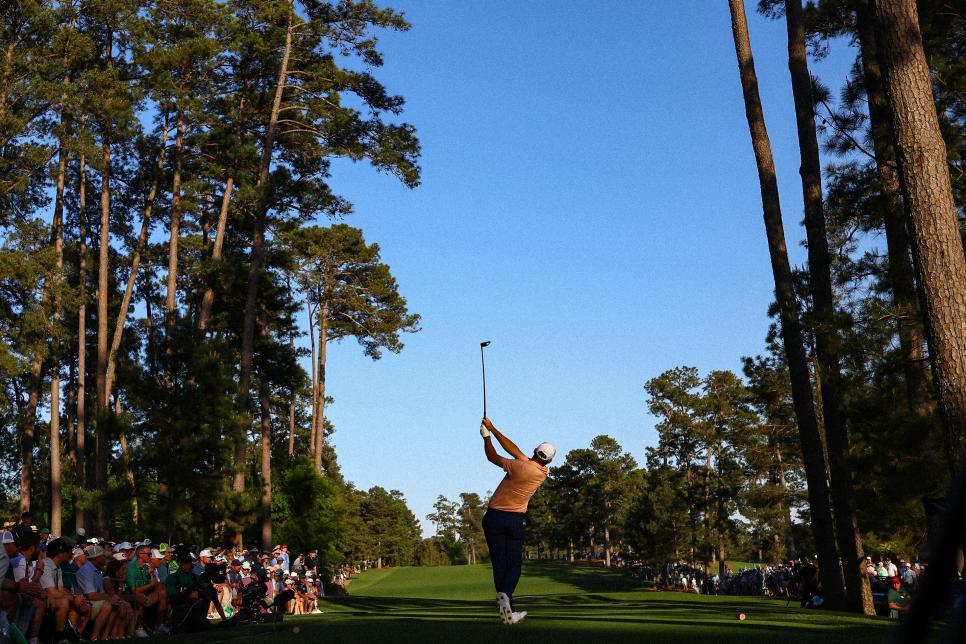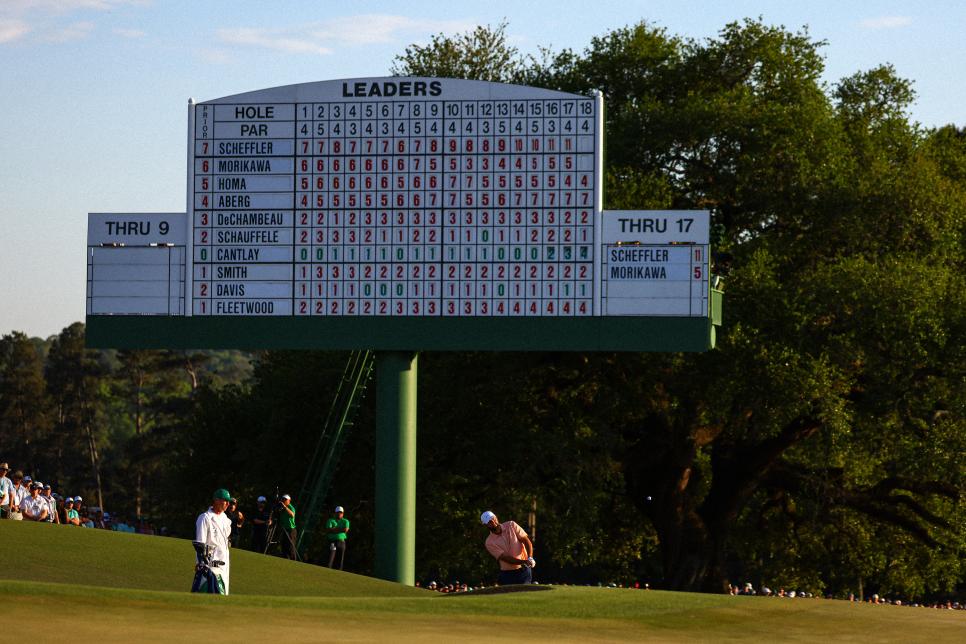masters
Masters 2024: Generational excellence like Scottie Scheffler's is riveting, even when it seems boring

Ben Walton
Scottie Scheffler is different, but you can be lured, for months and years, into thinking he's the same. Same talent, same person, as a dozen others that came before. His greatness sneaks up on you, and as late into the Scheffler Era as this past Sunday, you heard people call him boring; you heard them call his win boring. I think they're wrong, insofar as you can affix a label to that type of thing, but explaining why means explaining the difference, and how that difference is generational and therefore fascinating in ways that many of us watching the back nine at Augusta felt but couldn't name.
Moment 1: This is a memory from Rory McIlroy's brief existence as a killer, from Sunday at the 2014 PGA Championship in Valhalla. He was on the verge of winning his fourth major, and at the 10th hole, a tough par 5, he was the only player to hit the green in two and the only player to make eagle—an eagle he badly needed, trailing Rickie Fowler by three. But his second shot, a 3-wood, started low and left when he intended to draw it, which McIlroy readily admits. It gave him visions of a ball he had pulled OB on the same hole, with the same club, on Thursday. This time, though, the ball had a perfect fade, and came to rest seven feet from the green. It was the most important shot of his day, and it was lucky. He was celebrated that night as a steely-eyed closer, but the approach on 10 threw a kink into the juggernaut narrative, because, in order to win, he needed a big break.
But so what? This is golf. Everybody needs a big break when it comes to winning majors. Right?
Moment 2: From the press conference of Ted Scott, caddie to Scottie Scheffler, Sunday night at the Masters:
"He overcame my bad caddieing. In the first four holes, I couldn't get him on the green. On 5 finally hit the green, and JJ [Jakovac], Collin's caddie, goes, 'good job, man. You finally got him on the green.' I was like, 'thanks man.'"
Scheffler echoed him, in nicer words—his slow start on Sunday wasn't because he was hitting bad shots, but because the wind fooled them and they couldn't get the right club. Nothing unusual there, except when considered in the larger context of a victory that looked inevitable as Sunday stretched on, and everybody but Scheffler made the errors he never seems to make.
It occurs to you then that Scottie Scheffler seems to be the one person in the world right now who doesn't need a big break to win. When he's in the hunt, it's everyone else who needs the break.
And even when they get the breaks, it doesn't seem to matter.

Ben Walton
This is what’s called generational talent, and we haven't seen it in almost 20 years. Steve Stricker read the tea leaves when he picked Scheffler for the 2021 Ryder Cup—a decision that was richly rewarded—and starting in 2022, he was off to the races. The only hiccup was a few putting woes last year, but even that only served to highlight how remarkable his ball-striking had become—instead of winning, he was finishing third. When he fixed the putting, with help from a new coach and a bit of equipment advice from Rory McIlroy, he soared yet again to the top of the game, but this time he seemed more indomitable, more inevitable, more brilliant.
The sustained success of the last three years has officially made him the best professional golfer since Tiger Woods, a conclusion supported by analytics, the eye test, and every other metric you could dream up. With fewer majors, he has nevertheless leaped past Spieth, McIlroy, and Koepka in terms of pure ability. He doesn't have their legacy, yet, but if we're talking about peak performance, he's already surpassed them.
He's so much better than everyone else, which is a sentiment that is both commonplace—I saw it on Twitter over and over again—and revelatory. It's the thing you say because there is nothing else to say. You're left with the wild truth, which words can describe but never capture.
All of which is to say, nothing about what Scheffler is doing can possibly be boring if you appreciate golf and you appreciate excellence. It doesn't matter that the back nine turned into a blowout. It doesn't matter if his personality isn't quite what you want it to be—I personally think Scheffler is much smarter and more interesting than he's given credit for, but it's also true that he fits into a mold that you could call "American golfer" better than more singular personalities like Tiger or Phil ever did. It doesn't matter if he falls back on simple explanations or if he lives a simple life; the excellence speaks for itself. It's exciting for him.
This is why the experience of watching the Masters on Sunday was—at least for me—completely riveting even in the eventual absence of competitive drama. There's something irresistible about this kind of greatness, and it doesn't depend on whatever wild charisma inhabits the soul of a Jordan Spieth or Rory McIlroy in moments of high drama. This is more like reading about the campaigns of Ulysses S. Grant in the Civil War; there's something a little grim and attritional about it all, but there's a reason his memoirs were a massive bestseller and remain highly regarded. You can't help but feel in awe of Scheffler when he hits his competitive stride.
Nobody can tell anyone else what should be exciting to them, but if Sunday at Augusta felt dull to you—as it did to some—it might be time to recalibrate how you're watching. Scheffler has reached a level we haven't seen since the greatest player in history was at his peak, and there's no sign that he's about to stop. But of course he will stop, just like Tiger stopped, and then the moment will have passed, and if you didn't appreciate it at the time—if the jaw didn't drop, if the eyes didn't open a little wider—you won't get a second chance.
MORE GOLF DIGEST MASTERS COVERAGE
50 defining Masters Moments, ranked
The bogey golfer’s guide to surviving Augusta National
5 shots that players should NEVER hit at Augusta National
15 people who ended up in the Masters penalty box
The most memorable Rules issues in Masters history
In search of the greatest Augusta National
The greatest Masters round time has forgotten
The Champions Dinner tell-all, from those inside the room